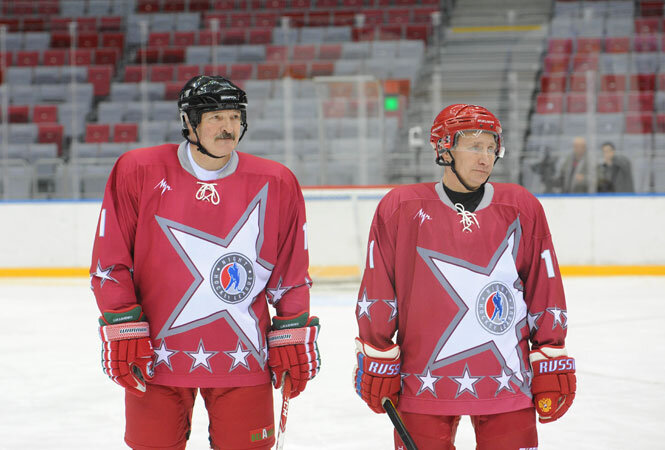Compass World: From Russia with Love
President Lukashenko of Belarus (left) plays ice hockey in Sochi with President Putin of Russia (right). (President of Belarus)
An eastern European dictator gracefully glides on the ice, moving the puck down the hockey rink. Although he seems like a character from a movie, this is Alexander Lukashenko, president of Belarus, playing in an amateur hockey match during a global pandemic.
Lukashenko’s response to COVID-19 has been an unconventional one, much like his unconventional history leading Belarus’ ten million people. The man who openly jokes about being the “last dictator in Europe” has yet to put the country on lockdown, saying, “it is better to die on your feet than live on your knees.” The Belarus Premier League, the country’s soccer league, is going ahead with its season, a lucrative decision: the Belarus Football Federation has now signed deals with ten countries for broadcasting rights. While Lukashenko may not see COVID-19 as a significant threat to Belarus’ wellbeing, rising tension with its neighbor, Russia, has.
Little Fish Eats Big Fish
Since the Cold War, Belarus has generally acted as a satellite state of Russia. In 1999, Belarus and Russia signed the Union State Treaty, which planned for the gradual integration of the two countries into a single state with a united parliament, currency, and constitution. When signing the treaty, a young and ambitious Lukashenko may have believed that he would someday rule this vast, new state.
After Vladimir Putin was named President Boris Yeltsin’s successor, any hope Lukashenko had of ruling a united mega-block vanished. Russia today is a much different country than the newly democratic Russia in freefall of the 1990s. Although progress on the union seemingly stalled in the mid-2000s, economic cooperation continued. Belarusian industry was given preferential oil and gas prices below the market rate. While Russia has claimed that these prices are a large enough incentive for integration, Minsk has remained reluctant due to cost disparities between Belarusian and Russian refineries that result from Russian subsidies of its domestic industry.
A Brotherly Squabble
For the past 20 years, Russia has used cheap oil and natural gas prices to consolidate its power in Belarus, a policy that has cost it an estimated $2 billion a year. In 2019, Russia began to place conditions on oil contracts in order to revive progress on the Union State, seeing it as a way to extend Putin’s term by allowing him to rule over a new country with a new constitution.
Putin seems to have grown tired of waiting for Belarus to move toward integration. Relations between the two countries soured in early January when Russia cut oil supplies after the two failed to agree on the price of the oil Russia sells to Belarus. Russia began demanding that Belarus pay more for oil until 2024, when it would pay market price. Such a move would squeeze a Belarusian economy that specializes in refineries, oil processing, and fuel exports. The standoff became so tense that Lukashenko threatened to siphon off oil from Russia’s transit pipeline to Europe unless Moscow restarted oil supplies.
After months at a standstill, Belarus recently reached an agreement with Russia’s biggest oil producer to buy crude at the fire-sale price of around $4 per barrel. This significantly lower rate can be attributed to the price war between Russia and Saudi Arabia. After the two countries failed to agree to reduce oil production in early March, Russia defied Saudi Arabia and started pumping oil without restraint. Saudi Arabia, not willing to lose the price war, followed suit. In its attempt to retaliate against Moscow, Saudi Arabia has started offering cheap oil to traditional Russian customers. Moscow felt pressure to reach a deal with Belarus as Saudi Aramco openly courted Lukashenko.
Belarusian Rapprochement
While Russia and Belarus eventually reached an agreement over oil prices, the incident shows the cracks developing in the two countries’ relationship. As relations with Russia sour, the West has moved to draw Belarus out of Russia’s orbit. In 2016, the European Union delisted 170 people and three Belarusian companies from sanctions. The Trump administration has also announced plans to reestablish diplomatic relations, which broke off in 2008. Lukashenko greeted Secretary of State Mike Pompeo in early February and, in typical fashion, jested that the Belarusian “dictatorship has a distinctive feature: everyone gets some rest on Saturday and Sunday, but the president works.”
Pompeo, during his visit, offered to provide Belarus with 100 percent of its oil needs at a competitive price. With a more adversarial Russia and a strong Belarusian demand for more reliable sources of oil, it becomes increasingly likely that Europe’s last dictatorship will realign itself with the West.

